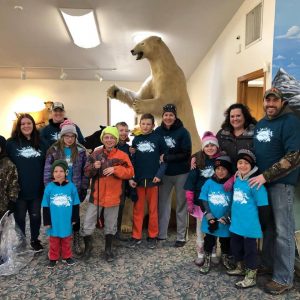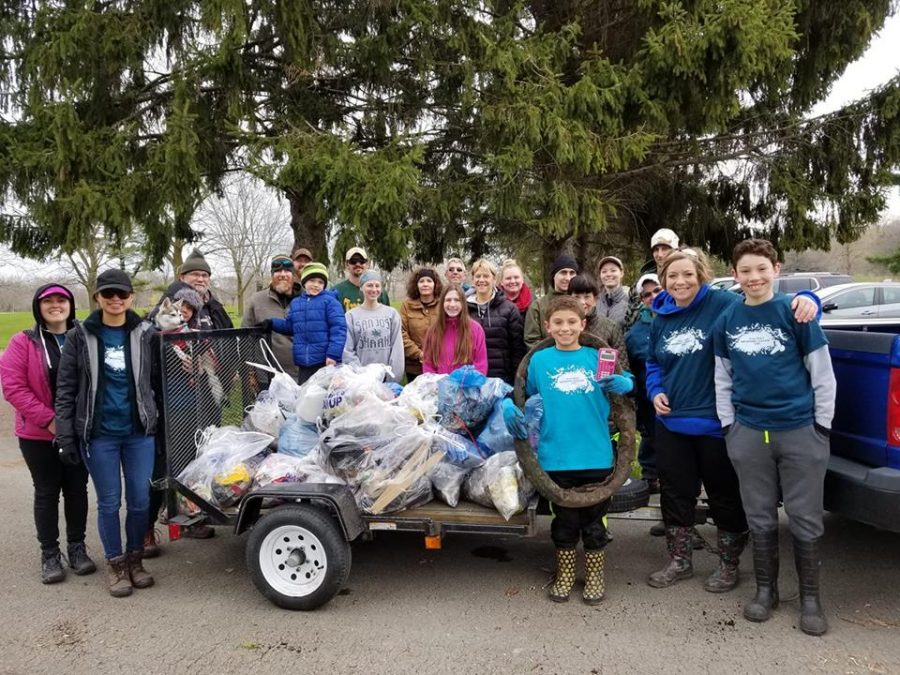Thousands show up to clean for Earth Week
Some of the 1,100 Fox-Wolf Watershed volunteers pose with collected garbage by the Fox River on April 27.
May 2, 2019
The UW Oshkosh campus ended Earth Week with the Fox-Wolf Watershed Cleanup on the Fox River on April 27, which saw nearly 1,100 volunteers register to clean up at one of the 62 coordinated sites coordinated.
Outreach coordinator Kelly Reyer said UWO has always scheduled a week of earth-minded activities for students, including tabling in Reeve on April 22; speaker Jill Hirosky and keynote speaker Malia Hulleman on April 23; e-waste collection; the showing of the film “The Human Element” and a presentation from speaker Melissa Weyland on April 24; the showing of the film “Dolores” and a bike fair on April 25; and tree planting and the showing of the film “Gasland” on April 26.
“I was excited to have the Fox-Wolf Watershed Cleanup listed as one of these events,” Reyer said.
UWO well and aquatic invasive specialist and site leader Hannah Nauth said her passion to clean up the world we live in was what inspired her to get involved.
“Seeing what effects litter has on our world as a whole is heartbreaking,” Nauth said. “I want to help make changes that will further our life here on this planet.”
UWO Sustainable Solutions for Tomorrow president Noah Schmidt said when deciding to help with the cleanup, he figured it would be a perfect opportunity for the club to get involved.
“I have always felt passionate about trying to clean up our environment, especially our local waterways,” Schmidt said.
Reyer said the Fox-Wolf Watershed Cleanup began in 2013 with fewer than 100 volunteers cleaning up at 13 sites along the Fox River.
“Since I started with Fox-Wolf Watershed Alliance in 2014 the event has grown significantly in the number of locations cleaned up and the number of volunteers participating,” Reyer said.
Nauth said she believes that cleanups should happen more often and in more locations.
“This cleanup was focused on the Fox-Wolf Watershed, which is extremely important to keep clean because if we allow trash to fill up our waterways, we will no longer have clean water,” Nauth said. “Our wildlife will not be able to survive in the polluted water, and a spiral of creatures dying off will begin to happen soon if we don’t start making changes.”

Volunteers pose for a photo to celebrate earth week.
Schmidt said he feels it would be great if events like this became more common.
“It would encourage networking between students who are passionate about protecting the environment and bring them together,” Schmidt said. “It would also help to keep our local waterways clean.”
Reyer said the cleanup took place along the lakes and rivers throughout the basin.
“Cleanup supplies include trash bags, recycle bags, gloves and trash grabbers,” Reyer said. “After cleaning up, all volunteers are invited to attend the Cleanup Picnic in Appleton for music, lunch, raffles and bounce houses — all free to our volunteers for their hard work cleaning up.”
Nauth said it’s important to be involved in cleaning up the planet because no one else is going to do it.
“If we as humans don’t pick up after ourselves, who will?” Nauth said. “Cleaning up is also only part of what is needed to be done. This is our planet, and if we don’t take care of it, we will reap the casualties.”
Schmidt said he feels it is important for all people to have at least a small role in helping to clean up the environment.
“With more people involved, the more effective a cleanup will be,” Schmidt said. “If we continue to not be involved as a whole community, we will stay part of the problem rather than becoming or finding the solution.”
Reyer said other things residents can do to help protect our waters is to realize what touches the ground can end up in our waterways.
“Our street’s storm drains take water directly to our lakes and rivers untreated,” Reyer said. “Because of this, it’s important to sweep grass clippings and leaves off of our roads and sidewalks as they carry nutrients like nitrogen and phosphorus to our lakes and contribute algal growth.”
Cleaning the planet can include composting at home, using green school supplies, saving important documents on a hard drive and emailing them to yourself in order to save paper or eCycling. For more information, visit epa.gov/recycle.














